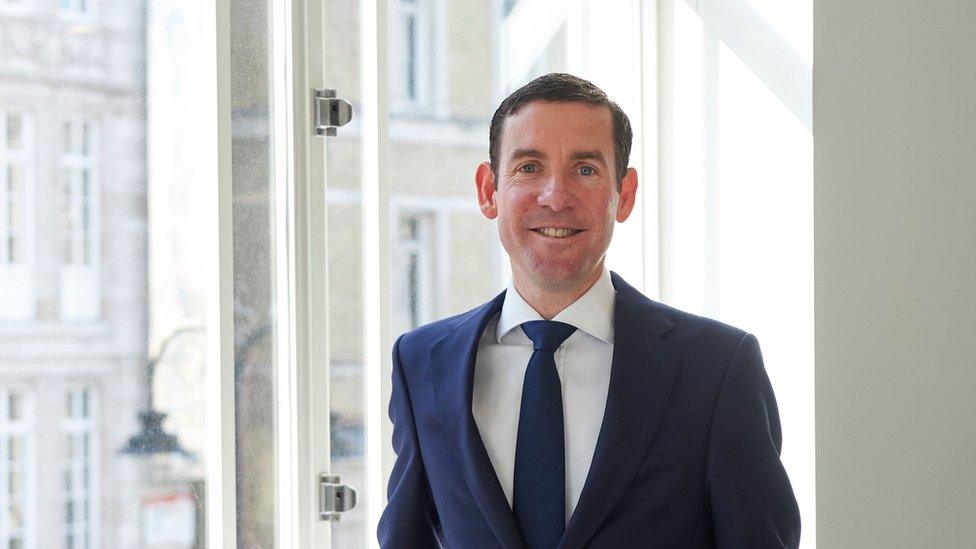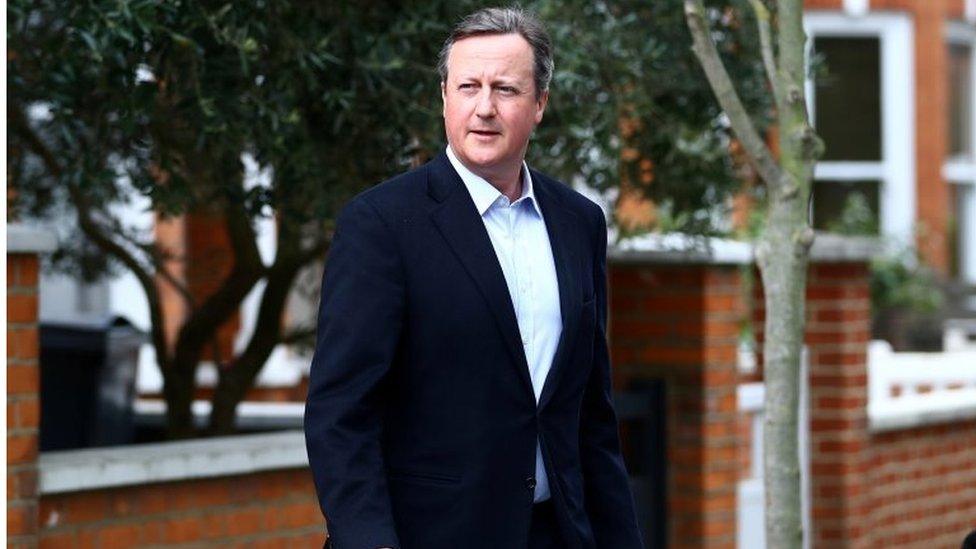Greensill had extraordinarily privileged access to government, says inquiry
- Published

Lex Greensill was an unpaid adviser to then Prime Minister David Cameron
Businessman Lex Greensill had a sometimes "extraordinarily privileged" relationship with government, a Cabinet Office report has found.
The report says, external the Australian financier's government role gave him "a marketing platform" for his business.
Civil servants "should have considered" the conflicts of interest, it adds.
Labour's deputy leader Angela Rayner said the report had been set up as "a classic Boris Johnson cover-up and whitewash to protect the government".
The report was also attacked by the widow of Jeremy Heywood, a former top civil servant who is criticised in the report.
Lady Suzanne Heywood describe the report as a "travesty" that "scapegoated" her late husband.
The inquiry also criticises ex-Prime Minister David Cameron for his lobbying efforts on behalf of Greensill's company, which collapsed in March.
Report author Nigel Boardman said Mr Cameron had "on occasion understated the nature of his relationship with Greensill Capital" when seeking to influence the Treasury's decisions.
However, he concluded that Mr Cameron "did not breach the current lobbying rules and his actions were not unlawful".
The government ordered an inquiry when it emerged the former prime minister had lobbied ministers via text messages on behalf of the finance firm.
At the time, Mr Cameron - who had taken a role with Greensill in 2018 - was accused of trying to exploit private contacts with former government colleagues, for his own benefit.
Greensill Capital specialised in supply chain financing - a technique aimed at making it easier for businesses to receive payments.

During Mr Cameron's time in Downing Street, Mr Greensill worked informally for the government before being made an unpaid adviser on supply chain finance.
Mr Boardman says "this area of public appointments is opaque and ill-defined" but adds that this appointment appears to have been "properly made".
'Revolving door'
Mr Greensill was later appointed to the Economic and Development Secretariat - something Mr Boardman says raises "significantly more questions" than the previous role.
He says it came as Mr Greensill was trying to set up his supply chain financing company in the UK and adds that the banker was able to use his position in government to "leverage his position" with major companies.
The job, Mr Boardman says, enabled Mr Greensill to "promote a product which did not, in fact, provide material benefits to government, although it could have been of benefit to his incipient business and was of immediate benefit to his former employer, Citibank".
He specifically criticises former top civil servant Lord Heywood saying it "should have been apparent... that Mr Greensill was building a supply chain business in the UK and should have considered the issue of conflicts of interest," the report says.
"It is unclear why Mr Greensill was permitted to remain an adviser to government on supply chain finance under these circumstances," he adds.
Mr Boardman also said Lord Heywood was "primarily responsible" for Mr Greensill securing a role in government.
Lord Heywood died in November 2018 and Mr Boardman says readers of the report should "bear in mind" that it could not include his personal explanation of the appointment.
Lady Heywood accused Mr Boardman of running "a deeply flawed process from beginning to end, gagging representation for my late husband to facilitate his scapegoating, and glossing over the ministerial approval the then coalition government gave for Mr Greensill's appointment".
She described the review as "nothing less than a travesty", adding: "His absence is being exploited to distort the facts of a decade ago and divert attention from the current government's embarrassment at the collapse of Greensill Capital long after Jeremy's death."
Considering the communications between Greensill and the government, Mr Boardman says: "It has been argued that the government's processes for managing lobbying are insufficiently transparent, that external organisations are able to exploit certain loopholes to land their messages more effectively, and that a privileged few have a disproportionate level of access to decision makers in government.
"I think some of these observations are justified, particularly in the context of the fact-finding work which I have done in relation to Greensill Capital's engagement with government."
The report also singles out for criticism the former top civil servant Bill Crothers, who in 2015 worked for both the government and as an adviser to Greensill.
Later that year, he left his civil service job and in 2016 went on to become a director of Greensill.
The report says some of his behaviour towards government departments while working for Greensill "was at the margins of acceptable conduct" and notes that he had to apologise to civil servants in the Ministry of Justice for being "too forceful" in his lobbying efforts.
Labour's Angela Rayner said the terms of Mr Boardman's inquiry had been limited "to avoid a wider investigation of lobbying, privileged access and the revolving door between Whitehall and business".
"The rules that are supposed to regulate lobbying are completely unfit for purpose and require radical and immediate overhaul," she added.
Responding to the report, Mr Cameron said he was "pleased that the report provides further confirmation that I broke no rules".
"I have said all along that there are lessons to be learnt, and I agree on the need for more formal lines of communication."
- Published9 August 2021

- Published12 April 2021
